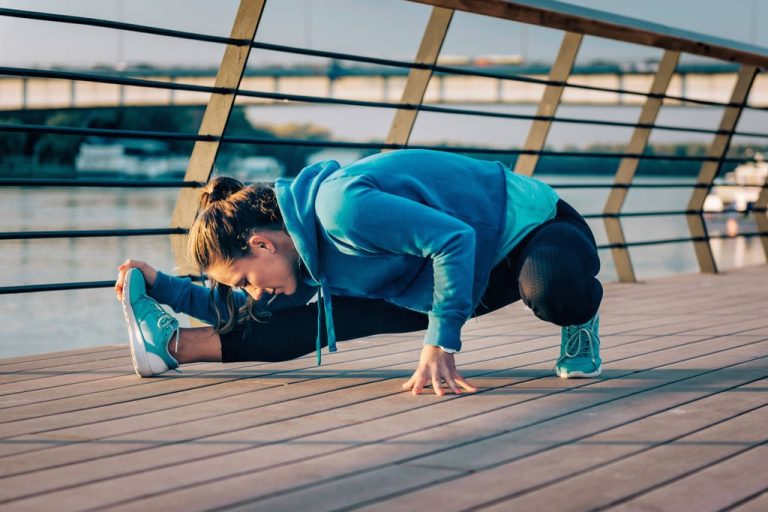If the training was too intense, aching muscles will develop. With relaxation, warmth and the consumption of protein-containing products, you will quickly get rid of the annoying pain.
Sore muscles: This helps with pain after exercise
Sore muscles are tiny tears in the muscle fibers that cause swelling, which in turn causes pain. The best thing is to prevent sore muscles and not suffer from them in the first place. Easier said than done, though, so we have great tips for you on how to relieve your sore muscles.
What happens to the body when muscles are sore?
A sore muscle is a micro-injury to the muscle. It generally occurs when an unfamiliar or new movement has been performed, or when the muscle has been overused. This is the case, for example, with very intensive training*. Tissue fluid penetrates the muscle fibers through the smallest injuries and they swell. However, according to the Bayreuth sports scientist Wolfgang Buskies, you don’t feel the pain immediately when the micro-cracks appear. Because the muscle fibers themselves have no pain receptors. For this reason, it takes a while before the pain receptors, which are located outside the muscle fibers, report the injury to the brain and we notice the painful muscle soreness.
Correct prevention helps against sore muscles
Before it comes to an unpleasant soreness, you can do a lot to prevent it from occurring in the first place. In general, it is advisable to only do sports when you are rested. The sports medicine doctor Dr. Axel Klein has more tips ready:
Make sure you have enough fluids in your body. That means drink, drink, drink! Water that contains plenty of sodium or apple or currant spritzer is best.
In addition, you should warm up properly before exercising. That means doing light movements for at least five to ten minutes. For example, brisk walking or jumping. Even after the sports unit*
Don’t give it your all right away, but ensure a moderate increase in the level. This gives the muscles a chance to gradually approach the effort.
A warm shower is recommended after exercise, as it relaxes the body.
You should not stretch too much before or after exercising.
I have sore muscles – what will bring me relief?
If your muscles are sore, you should first lean back and rest your damaged muscles. If possible, move the muscles in a relaxed manner, never straining. You can easily train the muscles that are not injured. In addition, you should adhere to the following:
The sore muscles should be stretched lightly, but not too much.
Warm up the muscles. This leads to increased blood flow to the muscles, which has a pain-relieving effect. In addition to a heating pad, we also recommend a visit to the sauna or a bath with mountain pine additives*.
You should also make sure you have enough protein
Get at least eight hours of sleep a night. This promotes the self-regeneration of the body.
Should I take medication?
Taking medication for sore muscles is not normally necessary. In any case, there are no medications for sore muscles themselves. If so, painkillers are often used, but they can have the opposite effect: painkillers can suppress the inflammation, which slows down the healing of the microcracks.
So it’s better to let your sore muscles heal naturally than to resort to painkillers. You can use heat to relieve the pain.
Should I see a doctor for sore muscles?
If the muscle soreness does not subside after several days, you should consult a doctor. If you still have trouble moving, be careful. Because in an emergency, rhabdomyolysis can be present.
In the case of three young women from Scotland, the severe muscle pain was definitely a case for the doctor: because their urine also turned brown. The family doctor, in whose practice all three were, immediately sent them to the hospital. The diagnosis: imminent kidney failure due to excessive strain on the muscles. Due to the causal overload, the mantle of the muscle cells was injured, causing them to push outwards. This released the muscle pigment myoglobin, which almost flooded the kidneys. For this reason, the urine of the women also turned brown. If the women had not been treated quickly, their kidneys would have failed and they would have died. The case shows how dangerous it is to exaggerate too much in sports.
Conclusion: Prevention, warmth and relaxation help with sore muscles
If you haven’t managed to prevent aching muscles, you can still do a lot to alleviate the annoying suffering. Heat has proven to be very helpful, for example in the form of a visit to the sauna or a warm bath with mountain pine additives*. You can also promote the self-healing of the muscle fibers by consuming protein products. Last but not least, you should also get enough sleep so that the body, and thus the muscles, can regenerate.

